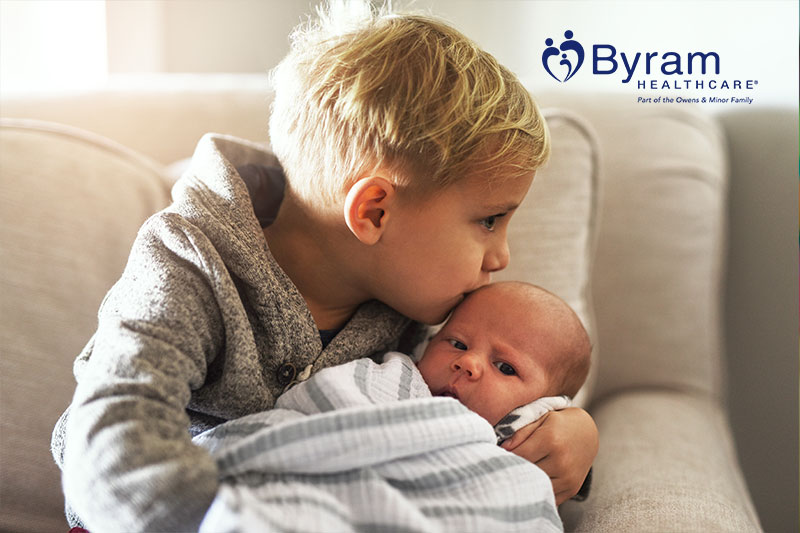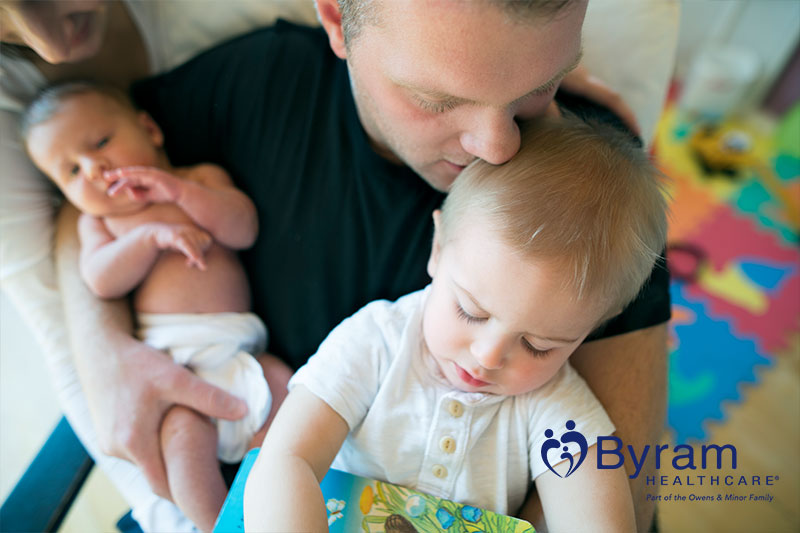Bringing Home Your Second Baby
Growing your family is an exciting time. There are so many things to look forward to and the vision you have for your future will inevitably start to change. Play dates with siblings, family vacations, and cute matching outfits all come to mind. While it’s easy to get wrapped up in the excitement, it’s important to remember that even though you’ve gone through pregnancy, delivery, and bringing a newborn home before, the second time isn’t going to be the same. Every pregnancy is different and now you have another little one that will need to be included in the acclimation process. To help you ease through this transition, we put together this article on what to know about bringing home your second baby.
Don’t Be Hard On Yourself
The love you have for your first child will have developed over years of watching them grow and develop into the tiny human they are. Don’t expect to immediately have the same love for your newborn. You will love your baby, there’s no question about it, but it will be a different type of love—neither greater nor lesser than your firstborn. Don’t be hard on yourself if you feel this way. Many mothers do and that’s okay.
Having high expectations is often the primary cause for disappointment during those first few weeks of parenthood to your new baby. Eliminating the expectations allows you to avoid being too hard on yourself and learn to love your newborn the way he or she will need to be loved.
Give Your Family Time to Adjust
Nothing will be easy when you first bring home your newborn. The family dynamic has fundamentally changed and everyone will need time to adjust. Give your family time. By taking the steps outlined in this article, you’ll help the transition go more smoothly without causing distress to your firstborn.
How to Make the Transition Easier
To help make the transition easier for you and your family, there are a few things you should keep in mind. Remember, those first few months are going to be crucial bonding time for your new family dynamic, so try to enjoy it.
1. Be Open to Help
Never, ever be afraid to ask for help or take any help that is offered. Having a newborn around is exhausting and sometimes stressful. Now that you have a newborn and a toddler, it will be twice as hard. If a friend or family member offers to help in any way, be open to it. Don’t feel bad about it! No one would offer to help if they didn’t actually want to.
2. Keep a Regular Routine
When you return from the hospital, try to stick to your firstborn’s regular routine. Doing so will help them feel normal and less like they’re living in the shadows. When you start to change the routine, it will cause confusion and many young kids start to misbehave or act out as a result. Try your best to keep a regular routine, even if it means juggling two different ones.
3. Don’t Try to Be Perfect
Let your house get messy and stop trying to be a superhero 24/7. Nobody’s perfect and you don’t have to be to be a good mom. Don’t get stressed when dishes pile up a little more than usual or if the laundry doesn’t get done as scheduled. It will be okay.
4. Take Breaks
If you need to rest, and you have some time to rest, do it. Don’t try to fill all of your down time with chores or catching up on cleaning. Listen to your body and take breaks when you need to. Ask for help from your partner to make this easier.
5. Supervise
Finally, it’s important to supervise your children’s interactions. Your toddler won’t fully understand your newborn’s needs or how fragile they are. They might be overly affectionate and while it’s adorable, it needs to be supervised to be safe. After you’ve given them time to adapt and learn, supervision won’t be as important.
How to Talk to Your Firstborn About Baby #2
This is arguably one of the hardest parts about bringing home your second baby. We’ve all seen the pregnancy announcements laden with unhappy firstborns crying or expressing looks of disgust. Your firstborn has had you all to yourself for years and all of a sudden they’ll have to share you with someone else. To make things easier, here are a few tips on how to talk to your firstborn about baby #2.
Break the News Easily
The first step is breaking the news to your firstborn. Do this around 12 weeks if your baby is older so they will be included in the excitement of a growing tummy. Be gentle in how you tell them and be prepared for any reaction possible. Just make sure you acknowledge their feelings and include them whenever possible to make things easier.
Show Them Their Newborn Days

Give your firstborn a chance to relate by showing him or her their newborn days. Show them any pictures or videos you have and tell them stories about what they were like when they were little. This will help them prepare for how your newborn is going to act.
Always Include Your Firstborn
Include your firstborn in everything possible. Make him or her a part of the pregnancy and have them help with brainstorming names, decorating the nursery, or picking out clothes. When a child feels included and important, they’ll be more excited about meeting their brother or sister. To keep them even more connected, have your firstborn go to your ultrasound with you to listen to the baby’s heartbeat.
Choose Your Words Wisely
Newborns are a lot of work. They often require immediate attention, which has the potential to cause problems with your firstborn. Always choose your words wisely when you talk. Instead of saying, “We can’t play right now I have to feed the baby,” say something like, “We can play in 20 minutes.” Taking out “the baby” makes it clear that no one is to blame for a lack of immediate attention to your firstborn. This reduces the chances of resentment and irritation. Use positive vocabulary and try to avoid using the words “no” or “stop” excessively.
Give Them Responsibilities
Giving your firstborn responsibilities, even if they’re small, makes them feel important. Enlist their help by asking for small favors and then reinforce them when they’re done. Talk to your newborn in front of your firstborn and tell them how great their big brother or sister is. Always show your gratefulness and reward your firstborn for being such a big help.
Communicate Honestly
When you go to the hospital to deliver, most families opt to have someone watch their firstborn rather than bring them along. If you choose this option, make sure you talk to them and communicate honestly about what’s happening. Explain what’s going to happen and who is going to stay with them.
When you bring your baby home, breastfeeding is going to cause questions. Again, explain what’s happening and what you’re doing. It’s also helpful to have something fun or exciting on hand for your firstborn to do during your breastfeeding sessions.
Introduce Your Newest to Your Oldest, Not Vice Versa
When your children finally meet, introduce your newest to your oldest. What we mean is, say something like, “Baby Hailey, meet your big brother Sean,” rather than, “Sean, meet your baby sister Hailey.” This simple switch will help your firstborn feel important.
Set Aside Special Time with Your Firstborn
Even though your newborn is going to need a lot of attention, it’s important to set aside special alone time with your firstborn. During this time, make sure it’s 100% one-on-one time. This may mean having your partner watch the newborn or it may mean getting a close friend or non-immediate family member to watch him or her. If you can dedicate alone time with you, your partner, and your firstborn, it will show them that they’re still just as important to you and will help avoid any regression.
Conclusion
Bringing home your second baby is an exciting time for you and your family. You’re growing and changing the entire dynamic for your future. While it might be tough at times, eventually everyone will adapt and your children will love and cherish each other every day. The most important thing to remember is to take the time you need to breath and don’t rush the bond or family development. If you need another breast pump for your second baby, don’t forget that the Affordable Care Act means that expectant mothers are eligible to receive an electric breast pump covered by their insurance provider! Just head over to our page and browse our selection.
If you’ve brought home your second baby, head over to our Facebook page today and leave a comment! We love hearing stories about growing families and are always curious to hear how firstborns react.






